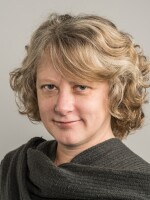#NPRreads is a weekly feature on Twitter and on The Two-Way. The premise is simple: Correspondents, editors and producers from our newsroom share the pieces that have kept them reading, using the#NPRreads hashtag. Each weekend, we highlight some of the best stories.
From Arts, Culture and Books Supervising Editor Ted Robbins:
The problem with a technology revolution designed primarily for men https://t.co/AE7gPYn6Lz via @qz #nprreads
— Ted Robbins (@truerobbins) March 19, 2016
We've heard a lot about how poorly women are treated in Silicon Valley. The findings of this study are proof of why it matters. Half the population, plus their male familiy members and friends, depend on having their needs addressed respectfully. I did some of my own research, by the way, and repeated the statement in the study to Siri on my own phone: "Siri, I've been raped," I said. To its credit, Apple appears to have corrected the oversight since the study was done. Siri responded by telling me to contact the National Sexual Assault Hotline.
From Executive Producer for Editorial Franchises Tracy Wahl:
#nprreads great digital piece from @OPBnews - Check out the interactive timeline https://t.co/7mBJrAMXZz
— Tracy Wahl (@Tracy_Wahl) March 18, 2016
This piece popped out of the world of digital writing for two reasons.
It had a great headline: "GOP Politicians Planned And Participated In Key Aspects Of Refuge Occupation"
And it was a fascinating follow-up to the standoff at the Malheur National Wildlife Refuge. It gave me great insight into the regional political forces at work that led to the confrontation and continue to simmer.
Its main focus was to explain how the Coalition of Western States, or COWS, had supported the standoff and the issues more generally.
The piece and the accompanying interactive timeline about the development of COWS shows how state lawmakers from four western states came together to form this group.
As a westerner myself I had closely followed the events in Oregon because I found the philosophical issues so interesting — states' rights, and tension between some ranchers and the federal government.
It's a great read. And a great example of compelling multimedia storytelling.
From Tanya Ballard Brown, an NPR.org editor:
In the wake of the latest terrorist attacks, I, like many others, have struggled to understand what creates and motivates today's suicide bombers. A friend shared this Newsweek story with me and it put things into context:
#NPRreads->These new age killers...are more like jihadi hipsters... celebrate 'pop-jihad as a lifestyle.' @Newsweek https://t.co/9nExCXzyw9
— Tanya Ballard Brown (@TdoubleB) March 23, 2016
"These European attackers are not like the Al-Qaeda members of old — the radicalized adherents to fundamentalist Islam. Many of these new age killers were small children when the World Trade Center fell in 2001 and have spent much of their lives watching major wars in Afghanistan, Iraq and now Syria. Their knowledge of Islam is quite limited; they are more like jihadi hipsters than dedicated Islamists, or what some experts in the intelligence community call "jihadist cool." They celebrate what the Dutch coordinator for security and counterterrorism called 'pop-jihad as a lifestyle.'
"These attackers also have their own rap music, hip clothes popular with young Muslims that are sold by companies like Urban Ummah and slogans akin to what might be found on a bumper sticker ("Work Hard, Pray Hard.") Their tweets often end with terms like #BeardLife and #HijabLife. While in Syria, they send selfies to their friends showing themselves wearing kohl, a traditional Middle Eastern eye shadow.
"In other words, these are not intellectual Muslims with long beards and Korans in hand; labeling them jihadis or radical Islamists would be, to them, the highest compliment. In another time or another circumstance, these are young people who would be called losers or narcissistic punks—although they are punks who murder."
According to reporter Kurt Eichenwald, it's less a love of Islam that sends them to Syria and Iraq, and more peer pressure and role modeling. And while an estimated 20 percent of the youth who return from fighting in Syria were suffering from mental illness before they left home, a more telling commonality is that most of them come from communities with few job options and lots of poverty. These are hopeless young people who gain a sense of purpose through ISIS. Sounds like what we have found here in the States about why young people join violent gangs.
Copyright 2021 NPR. To see more, visit https://www.npr.org. 9(MDAxNzg0MDExMDEyMTYyMjc1MDE3NGVmMw004))










